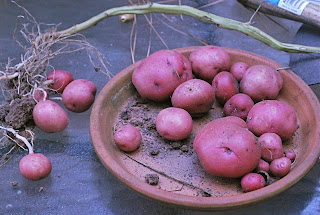 I cannot believe that I've let a month go by without posting--it will not happen again. Though I've not been writing, I have still been gardening, learning, reading, and cooking. I also helped a friend of mine with her Young Writers program and traveled to a bluegrass festival. But enough of that, let's talk food.
I cannot believe that I've let a month go by without posting--it will not happen again. Though I've not been writing, I have still been gardening, learning, reading, and cooking. I also helped a friend of mine with her Young Writers program and traveled to a bluegrass festival. But enough of that, let's talk food.The photo you see is from a recent lunch with my friend Glenna, which was inspired by watching an old DVD of Julia Child making Salade Nicoise on the French Chef.

This beautiful salad deserved a photo of its own, but I couldn't help posting our little table in the corner of the kitchen with the beautiful napkins we bought while in Apt, France, two glasses of my favorite Sancerre, fresh cut flowers, and crusty French bread. Bon Appetit!
There was a bit of timing involved with this as I had a few potatoes left in the garden to harvest, and I wanted to use those potatoes for our lunch. Only one tomato was ripe from the garden, so I used that in our salad as well; and the eggs and cucumber came from Randle Farms. I wish I could say everything was local, but I cannot.

The potatoes have definitely been a learning experience, but that's what this year's garden is all about--learning so that we can be more productive next year. You can see the potatoes poking through the soil. This plant was fairly typical of what was produced this first season in the garden; each plant had two to three small red potatoes with lots of tiny spud babies (you can see one at the top center of the photograph).

The harvest at the left was what remained of the three last plants in the garden. With twelve plants, we did have a few meals with our own potatoes, but this was disappointing. What did I learn? A number of things. Potatoes are soooo easy to grow. I let a few potatoes from Earth Fare sprout eyes, and then I cut them into one-inch pieces and threw them into the ground, and covered them with straw after the plant appeared. Then I just waited. Even though I planted them during the window of opportunity suggested by Farmer's Almanac, it was too late in the season for this part of Alabama, I think. One of the causes of a small crop is hot temperatures, and we had plenty of that beginning the last week of May with temperatures consistently 90 and above. Potatoes also take up a good bit of room in the garden, and they take a lot of nutrients from the soil, so when I plant another crop in the fall, I'm going to plant them in a huge container. We'll see what happens.
Like a summer salad, this post will be several things tossed together in order to catch up.
In March and April, I wrote about Meatless Mondays, which was started by the Johns Hopkins Bloomburg School of Public Health. Today is Monday, and I wondered what might be floating out there on the internet from recipe sites, so I went to two sites with which I'm familiar. Apparently Meatless Mondays was not on either site's radar this week.
Yahoo has a weekly feature called "What's for Dinner This Week," and this week is mainly about meat. Five of the seven days feature pork, beef, or chicken; one day is vegetarian with a Mediterranean pizza; and one day features a fish recipe. Epicurious.com also has a section called Everyday Cooking that features menus for weeknight suppers, and meat is definitely on their menus this week with four out of five offerings made with poultry, beef, or salami. The remaining weeknight features fish. As for me and mine, we're having a summer squash and mozzarella tart for supper tonight. Father's Day weekend (yes, weekend at our house!) was filled with meat, and I'm ready to get back to vegetables.

No comments:
Post a Comment